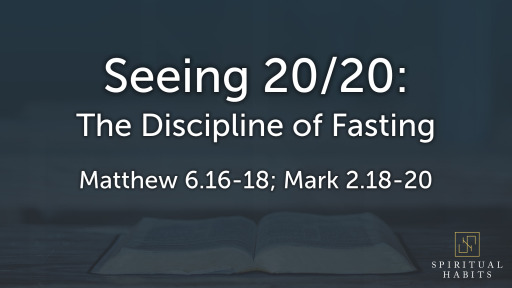The Discipline of Fasting

Notes
Transcript
What is your goal for 2020?
What is your goal for 2020?
Where do you want to head in this year? How will you get there? In our elementary school they are teaching our kids to begin with the end in mind. Helping them to see the importance of planning and preparing for what you want to accomplish. I could take this trait and sum it up in one word—intentionality.
Our culture enjoys minimalism.
Our culture enjoys minimalism.
This is seen in the tiny home living, which I must admit I love the spaces they have come up with. Marie Kondo and the her system of decluttering and organizing your house, all based on not having more than what we need.
Our faith is private and public.
Our faith is private and public.
We must live in both worlds. Having just a private faith will lead us to neglect evangelism and loving others. A public only faith neglects growing deeper and we do not have much to ground us in the changing world.
Jesus assumes fasting would happen.
Jesus assumes fasting would happen.
In our text, and the few others he spoke on this topic it hints at this being something his followers would continue to engage in this religious practice. Though he never says, “do this”, he also never says, “don’t do this”. The practice of the early church included fasting at some point in time.
The question: How would Jesus’ disciples understood fasting?
The question: How would Jesus’ disciples understood fasting?
1. Normal fast, without food or drink except water.
1. Normal fast, without food or drink except water.
This is the example of Jesus in the wilderness.
2. Partial/Daniel Fast-limiting certain food or giving up something normally used.
2. Partial/Daniel Fast-limiting certain food or giving up something normally used.
This is the example of Daniel we see in Daniel chapter 10. Many churches do this to begin the year.
3. Corporate Fasts-community gives up food and drink for repentance.
3. Corporate Fasts-community gives up food and drink for repentance.
4. Absolute Fast-nothing to eat or drink for a limited time period.
4. Absolute Fast-nothing to eat or drink for a limited time period.
Acts 9 and Esther 4 are examples of this. Typically only done for a max of 3 days.
The Pharisees and religious leaders would fast on Mondays and Thursdays. Some would immediately have had the image of their fasting come to mind when Jesus spoke these words.
Fasting is not about self-punishment.
Fasting is not about self-punishment.
Jesus says, be normal!
Jesus says, be normal!
We don’t need to broadcast what we are doing, at least not to everyone. We can and should look like we normally do.
Fasting is not just “not eating”.
Fasting is not just “not eating”.
Fasting is giving up to focus on God.
Fasting is giving up to focus on God.
I think this is part of the meaning Jesus has when in the wilderness he said the words, “Man does not live by bread alone but on every word that comes from the mouth of God.” He quotes Deuteronomy 8.3 and how God allowed hunger to be a reminder for the Israelites that they need Him.
Fasting can act like a “reset” button.
Fasting can act like a “reset” button.
Especially in our world as we have excess of about everything. We are more than enough and as such can easily be entangled by things.
The motive matters.
The motive matters.
Why we do what we do matters. Do you engage in public faith in order for people to see you? Do you hide your faith so as to fit in?
The goal: to hear Jesus clearer, deeper.
The goal: to hear Jesus clearer, deeper.
What is in the way of your hearing Jesus?
What is in the way of your hearing Jesus?
This may be the area you need to fast from.
